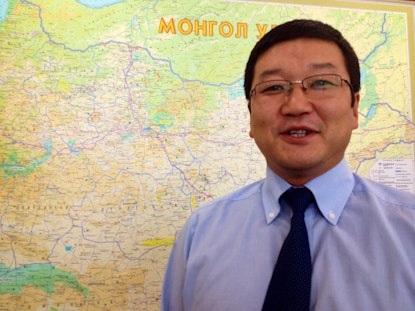In Mongolia National Advocacy Results in Changes to Law

“We have the same goal in the end: better procurement.”
With these words Khurelbaatar Gantsogt highlighted the shared objective of government and civil society in Mongolia: to improve public procurement processes. As the State Secretary of the Mongolian Ministry of Finance, making a statement like this would have been unheard of previously. Over the past five years civil society organizations (CSOs) and government, under the leadership of the procurement policy department, have been working together on reforming procurement in Mongolia.
This collaboration is particularly important today. Mongolia is undergoing a major economic transformation as it begins to exploit its vast copper, gold, coal, and other mineral resources. With one of the largest mining reserves in the world, huge revenue inflows have caused the economy’s growth to accelerate by double-digits in 2011 and 2012, where it will likely remain as new mines become operational.
Key to harnessing this surge will be the effective use of these increasing revenues, with the major responsibility falling on the Government’s public investment and procurement systems. With the right institutions and policies, this resource boom has the potential to can improve the lives of current and future generations of Mongolians.
The recently amended 2011 Public Procurement Law captures the unique way in which government and CSOs in Mongolia are collaborating to establish these effective institutions and policies – and in particular to make procurement more transparent and accountable. For the first time in Mongolia this new law includes a formal role for civil society in evaluating bids for, and monitoring implementation of, public contracts. This places Mongolia at the forefront of disclosure and participation in public procurement.
An important response to this new law is the formation of the Public Procurement Partnership of Mongolia, which represents one of the first times that CSOs working in procurement in Mongolia have advocated for regulatory changes as a joint network with a unified message. Established in 2012, the Partnership is led by Otgonjargal Norovjav, one of the most experienced procurement practitioners in Mongolia who helped to draft the new Procurement Law, and its new coordinator Ganzorig Gombo. This coalition of approximately 60 CSOs is working to build awareness, participation, and accountability around public procurement, and since its 2012 launch has made notable progress in terms of its network and development.
Mongolia has decentralized much of its financial and procurement processes in recent years, with local governments now increasingly responsible for directly managing large budgets and procurement. The Partnership has thus prioritized building up its membership base at the aimag (district) level. In Uvurhangai aimag, for example, the Partnership signed a memorandum of understanding with the local governor’s office which gives Partnership members access to contracts and engages them in bidding and project implementation monitoring. The current focus is on developing sub-networks in 4 aimags and in the capital of Ulanbataar, where the Partnership plans to announce a cooperation agreement with the Mayor’s office this month focused on contract and service delivery monitoring.
This joint effort has magnified CSOs’ strength to engage with government agencies through increased coordination of their advocacy efforts. This ultimately resulted in the Ministry of Finance incorporating important demands from the Partnership in the Implementing Rules and Regulations of the new procurement law. Passed in the fall of 2012, the changes included allowances for monitors and the use of specific reporting templates.
This example of collaboration is an important first step toward institutionalizing citizen participation in the procurement system. The acceptance of civil society is a key piece of establishing a culture of open contracting – a collaborative effort to enhance disclosure and participation in public contracting.
A country in which contracting processes are transparent and a wide range of actors have the opportunity and capacity to monitor those processes, is a country in which corruption is discouraged and resources are spent more effectively. Given the enormous resource boom currently occurring in Mongolia, it is more important than ever to establish such a culture to successfully translate the enormous inflows into goods and services for citizens. Making civil society oversight more accountable and professional nationwide will help allow Mongolia’s procurement system to better satisfy its citizens’ needs.
The Partnership is collaborating with the government to move toward this goal, and has set the tone for constructive engagement as an important part of its effort. The World Bank and the World Bank Institute (WBI) have supported procurement reforms in Mongolia, in particular by helping the Partnership in developing a united message and working with the government, as well as on structuring the network and engaging potential members. Key challenges in the short term include the establishment of sustainable funding sources and a business model, as well as the development of structures and procedures for evaluation, learning, and communication among members. Continued support will focus on engaging the government and on creating and disseminating tools to strengthen capacity and credibility.
Sustaining the momentum of the Partnership’s efforts will prove critical to the successful adoption of an open contracting culture in Mongolia. As observed by Gantsogt and evident in the enhanced civil society role in the 2011-12 legal reforms, “it is not just the government that drives the movement” – rather, it is the effective engagement of its citizens that is the key to effective policies and processes.
The desire for transparency is clear and progress thus far bodes well for the continued collaboration of distinct stakeholder groups wishing to see Mongolia’s people benefit from its recent unprecedented economic growth. The recognition of the importance of civil society, and the value of its collaboration with the government, has built a solid foundation to continue advancing efforts that will lead to better services for all Mongolians.